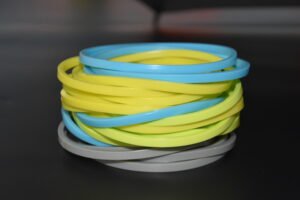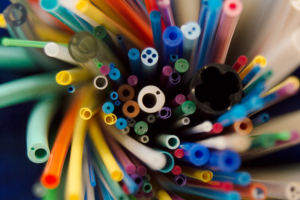Silicone tubing and silicone seals have become indispensable components in various industries, thanks to their exceptional properties and versatility. From healthcare and food processing to automotive and industrial applications, silicone products offer numerous benefits that make them the preferred choice for many manufacturers and engineers. This article delves into the advantages of silicone tubing and silicone seals, highlighting their key features and applications.
Properties of Silicone Tubing and Silicone Seals
Heat Resistance
One of the most notable advantages of silicone tubing and seals is their remarkable heat resistance. Silicone can withstand a wide range of temperatures, from as low as -60°C to as high as 230°C. This makes silicone an ideal material for applications that involve extreme temperatures, such as:
- Medical devices: Silicone tubing is commonly used in medical devices that require sterilization at high temperatures.
- Automotive: Silicone seals are used in engine components and exhaust systems due to their ability to endure high temperatures without degrading.
- Food processing: Silicone tubing is used in food processing equipment that operates at high temperatures, ensuring safety and durability.
Flexibility and Elasticity
Silicone’s flexibility and elasticity are other significant advantages that make it suitable for a variety of applications. Silicone tubing and seals can easily bend and stretch without losing their shape or integrity, making them ideal for:
- Fluid transfer: Silicone tubing is widely used for fluid transfer in medical and laboratory settings due to its flexibility and ease of use.
- Sealing applications: Silicone seals provide a reliable and durable seal in applications that involve movement or vibration, such as machinery and automotive components.
- Custom applications: Silicone can be easily molded into custom shapes and sizes, allowing for tailored solutions in various industries.
Chemical Resistance
Silicone’s resistance to chemicals and solvents is another critical advantage, making it suitable for applications that involve exposure to harsh substances. Silicone tubing and seals are resistant to a wide range of chemicals, including acids, alkalis, and oils, making them ideal for:
- Chemical processing: Silicone tubing is used in chemical processing plants for transferring aggressive chemicals without degrading.
- Food and beverage: Silicone seals are used in food and beverage processing equipment to prevent contamination from cleaning agents and other chemicals.
- Automotive: Silicone seals are used in automotive components that come into contact with oils and fuels, ensuring long-lasting performance.
Biocompatibility and Safety
Silicone’s biocompatibility and safety make it an ideal material for medical and food-grade applications. Silicone is non-toxic, hypoallergenic, and does not support bacterial growth, ensuring safety and hygiene in sensitive applications. Key benefits include:
- Medical devices: Silicone tubing is used in medical devices such as catheters, IV lines, and respiratory equipment due to its biocompatibility and safety.
- Food-grade applications: Silicone tubing and seals are used in food processing and packaging to ensure safety and compliance with FDA regulations.
- Personal care products: Silicone is used in personal care products such as baby bottles and pacifiers due to its non-toxic and hypoallergenic properties.
Applications of Silicone Tubing and Silicone Seals
Healthcare and Medical Applications
Silicone tubing and seals are extensively used in the healthcare and medical industries due to their biocompatibility, flexibility, and durability. Some common applications include:
- Catheters and IV lines: Silicone tubing is used for catheters and IV lines, providing a safe and reliable conduit for fluids and medications.
- Respiratory equipment: Silicone seals are used in respirators and breathing apparatus to ensure a secure and leak-free fit.
- Medical implants: Silicone is used in medical implants such as breast implants and joint replacements due to its biocompatibility and durability.
Food and Beverage Industry
Silicone tubing and seals are essential components in the food and beverage industry, ensuring safety and hygiene in various processes. Applications include:
- Brewing and fermentation: Silicone tubing is used for air transfer in brewing and fermentation processes, ensuring contamination-free operations.
- Food processing: Silicone seals are used in food processing equipment to prevent leaks and ensure hygiene.
- Packaging: Silicone seals are used in food packaging to maintain freshness and prevent contamination.
Industrial and Manufacturing Applications
Silicone tubing and seals are widely used in industrial and manufacturing applications due to their heat resistance, chemical resistance, and durability. Some key applications include:
- Chemical processing: Silicone tubing is used for transferring aggressive chemicals in chemical processing plants.
- Machinery and equipment: Silicone seals provide reliable sealing solutions for industrial machinery and equipment, ensuring leak-free performance.
- HVAC systems: Silicone seals are used in HVAC systems to provide effective sealing and insulation.
Automotive Industry
The automotive industry relies on silicone tubing and seals for their durability, heat resistance, and chemical resistance. Applications include:
- Engine components: Silicone seals are used in engine components to provide reliable sealing in high-temperature environments.
- Fluid transfer systems: Silicone tubing is used for fluid transfer in automotive systems, ensuring durability and performance.
- Exhaust systems: Silicone seals are used in exhaust systems to withstand high temperatures and prevent leaks.
Home Appliances and Consumer Products
Silicone tubing and seals are used in various home appliances and consumer products due to their safety, flexibility, and durability. Applications include:
- Kitchen appliances: Silicone seals and tubing are used in kitchen appliances such as ovens, refrigerators, and dishwashers for their heat resistance and durability.
- Personal care products: Silicone is used in personal care products such as baby bottles, pacifiers, and teething toys due to its non-toxic and hypoallergenic properties.
- Cleaning equipment: Silicone seals are used in cleaning equipment to provide reliable sealing and insulation in high-moisture environments.
Conclusion
Silicone tubing and silicone seals offer numerous advantages that make them the preferred choice for a wide range of applications across various industries. Their heat resistance, flexibility, chemical resistance, biocompatibility, and safety make them indispensable components in healthcare, food processing, industrial, automotive, and consumer product applications. As technology advances and the demand for high-performance materials continues to grow, silicone will undoubtedly remain at the forefront of innovation, providing reliable and versatile solutions for manufacturers and engineers worldwide.


